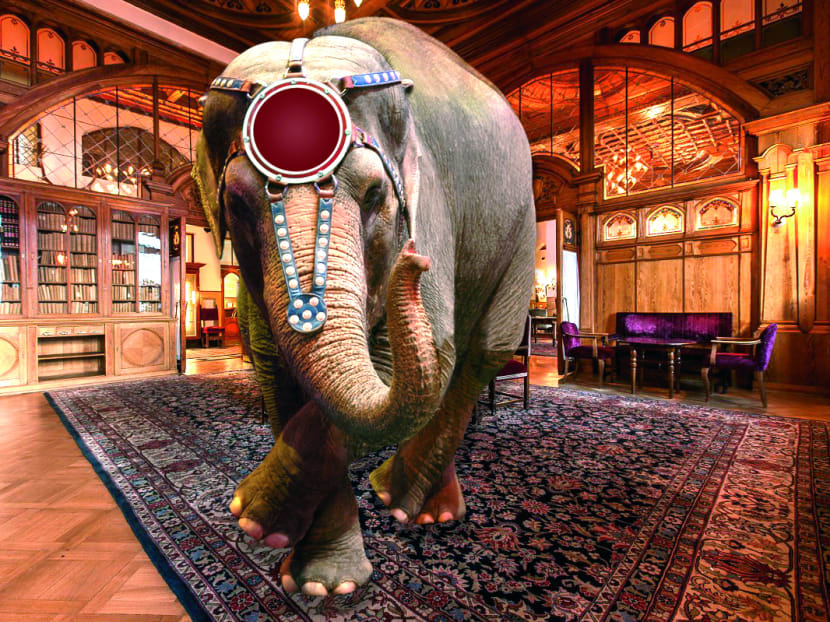Concierges: Ask them anything - really
Some travellers are reluctant to trouble a concierge with a complicated request — if he’s busy with something more important, wouldn’t it be rude to disturb him? But concierges are there to make a guest’s stay as comfortable as possible and are willing and able to do far more than simply secure a table in a popular restaurant. In the recent film The Grand Budapest Hotel, Ralph Fiennes plays the concierge, and it would seem this under-appreciated vocation is finally getting widespread attention. But just how far do concierges go to satisfy guests’ more unusual — and some would say, unreasonable — requests?


Some travellers are reluctant to trouble a concierge with a complicated request — if he’s busy with something more important, wouldn’t it be rude to disturb him? But concierges are there to make a guest’s stay as comfortable as possible and are willing and able to do far more than simply secure a table in a popular restaurant. In the recent film The Grand Budapest Hotel, Ralph Fiennes plays the concierge, and it would seem this under-appreciated vocation is finally getting widespread attention. But just how far do concierges go to satisfy guests’ more unusual — and some would say, unreasonable — requests?
DOGS SAY ‘I DO’
Abbas Golestani, the head concierge at the Beverly Hills Hotel, said a request from a Russian guest took him by surprise. “She bred dogs and decided that two of her collies should be married at the hotel,” he explained.
Luckily, Golestani knew a judge who acted as a minister at wedding ceremonies and was willing to officiate. With that sorted, the hotel’s catering team prepared a dog-friendly cake and treats for the special day, and customised outfits were procured — the “groom” wore a tuxedo and bow tie, the “bride” was dressed in traditional white and had two “bridesmaids”.
The event was organised in three days, cost about US$15,000 (S$18,800) and earned Golestani a reputation as the go-to concierge for canine-related inquiries. “One guest asked me and my team to speak to his dog in its own language, so we all had to bark at it rather than use English,” he recalled. “Another guest asked me about having plastic surgery performed on his dog, but I didn’t refer them to a surgeon on that occasion.”
THE ELEPHANT IN THE ROOM
The manager of Badrutt’s Palace in St Moritz, Angelo Martinelli, has dealt with some unusual requests during his 50 years at the hotel. “About 18 years ago, one guest wanted to give his wife a birthday present. We suggested she would be more impressed if he gave her something unpredictable,” he said.
They arranged for her to be sent an elephant. A circus was touring through Switzerland at the time, so the concierge team enlisted its trainer to take the animal into the hotel. The “incredibly surprised” wife had an hour-long audience with the elephant before it rejoined the circus.
CONNECTION ISSUES
A 45-minute seaplane ride from the Maldivian capital, Male, to Velaa Private Island is an enveloping retreat for high-powered travellers keen to escape it all. But a holidaymaker found himself at a loss after dropping his iPhone in the pool — how would he manage his affairs while away? Although his butler and personal concierge arranged the purchase of an iPhone through a contact in Male and confirmed that it could be delivered on the first scheduled flight that evening, it was decided that wasn’t quick enough. So a seaplane was chartered to fly the iPhone to the island straight away. (Chartering a seaplane from Male typically costs more than US$10,000.) Just over two hours after destroying his old handset, the unfortunate holidaymaker was able to make personal calls on his new iPhone.
WILD THEMES
At Cottar’s Safari Camp in Kenya, the guides serve as concierges and often need to appease guests more used to city life. One American couple visited during the wildebeest migration, but stipulated that they didn’t want to see blood spilt at any point. For Louise Cottar, this presented clear logistical difficulties. “We obviously don’t control what happens during feeding seasons,” she said.
But the guides were able to deal with the request. “A spotter sat in an elevated position at the back of the car and surveyed the surroundings with binoculars,” explained Cottar. “He was able to warn the driver in Swahili about any nearby kills, and they could then discreetly drive in another direction. The family ate meat at dinner, but managed to avoid seeing an animal being killed during the safari.”
Another guest attended a ceremony where the Maasai tap a cow’s jugular with an arrow and drink the blood. “He asked to drink the fresh blood too. We were surprised, but were able to arrange it and the tribespeople were happy for him to participate. They considered his positive approach an honour.” THE DAILY TELEGRAPH





